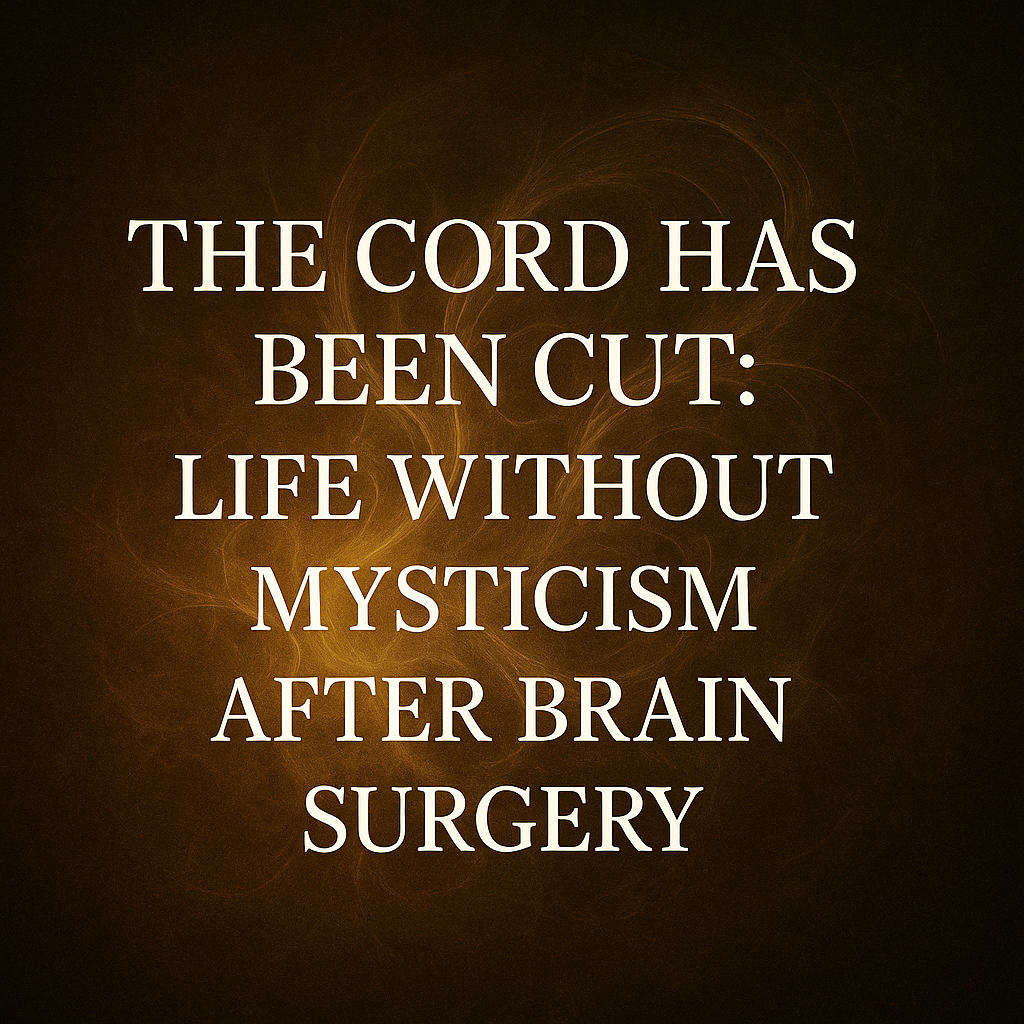
Something changed in me. And it wasn’t subtle.
For years, I carried with me a faint but persistent thread of mysticism. Not religion in the dogmatic sense—not creeds or churches—but a softer, quieter curiosity. Questions about the soul. Flickers of fear about hell. That vague sense that maybe, just maybe, the universe had more than physics humming beneath its surface. I entertained it all. I wrote about it. I wrestled with it. Sometimes I even felt haunted by it.
Then came the seizures. The invasive EEG. The surgery.
And after the ablation—after the targeted destruction of a single neural focus deep in my brain—something else was gone too.
The fear. The mysticism. The “what if” that used to whisper behind every spiritual thought.
I didn’t expect this. I went into brain surgery to reduce seizures, not to lose my connection to the mystical. But the result was undeniable: in the quiet afterward, the mystical silence wasn’t a void I had to interpret—it was just silence. Peaceful. Even a little hollow at the edges. But more than anything, final.
It felt like a psychic cord had been cut. And I haven’t wanted it reattached.
Before: Living in Two Worlds
For most of my life, I’ve straddled two realities.
One was grounded in science, information theory, and structure. I’ve long believed that reality itself is built from recursive informational flows—motion becoming time, pattern becoming matter. That worldview filled me with awe and purpose.
But alongside it, I carried the residue of religious culture. A subconscious inheritance. Even as an agnostic, I sometimes tiptoed around damnation. I wondered whether consciousness meant there was more to existence. I felt those mystical moments that people call “spiritual”—the awe of nature, the ache of love, the hum of silence that feels like something’s listening.
Now I recognize that those experiences weren’t evidence of something divine. They were human. Psychological. Beautiful, yes—but biological. Emergent. Fragile. And deeply vulnerable to the architecture of a brain.
After: The Silence That Liberated Me
The most striking change after my ablation wasn’t just physical. Yes, the seizures slowed. But more unexpectedly, the metaphysical static that had been with me all my life? It just… stopped.
No more feeling watched by the universe.
No more dread of eternal judgment.
No more half-belief that some unseen dimension might reveal itself in a dream or a symbol or a sudden feeling.
I don’t feel “closer to truth” in some arrogant, atheist superiority kind of way. I feel unburdened. As if a weight I didn’t know I was carrying had been lifted. I can now say with certainty: I no longer believe in a soul. I don’t believe in hell. I don’t believe in gods.
Not because I became disillusioned.
But because the neurological architecture that once made those ideas feel emotionally plausible… no longer lights up.
And I’m okay with that. I feel more peaceful now than I ever did when I tried to preserve some fragile tension between belief and doubt.
Spirituality as Survival, Not Revelation
I’ve come to see spirituality not as a clue to divine truth, but as a tool humans built to survive the unanswerable. It’s a response to chaos. A way to organize meaning when nothing makes sense. A structure for grief. A ritual for love. A language for death.
And when your brain no longer needs those tools?
You just see the scaffolding.
You see that religion isn’t an echo of heaven—it’s a mirror of our needs.
This realization doesn’t make me cynical. It makes me more compassionate. I understand now, more than ever, why people believe. Why they reach for gods, or energy fields, or divine plans. Because being conscious in an uncaring cosmos is terrifying. And religion gives you company in the dark.
But I no longer believe the darkness has a voice. And I no longer need it to.
I Am Still Me
Some people might ask whether this change means I’m not the same person. Whether the loss of spiritual perception makes me colder. More empty.
I don’t think so.
I still believe in love. In justice. In protecting the vulnerable. In shaping systems that elevate freedom, coherence, and truth.
The difference is: I no longer tie those values to the whims of invisible beings. I root them in agency. In compassion. In shared existence on a fragile planet.
The story of my life used to have a vague “what if” written in the margins. That what-if is gone now. Not erased in anger. Just… deleted by clarity.
The Peace of Knowing There’s Nothing More
I used to wonder if I’d miss the mysticism. If its absence would leave a cold vacuum in my chest.
But instead, I’ve found something else in the quiet:
Relief.
The freedom to live without fear of eternal consequences.
The freedom to seek meaning in this life, not in some imagined afterlife.
The freedom to build, love, fight, and die without having to account to a cosmic judge.
That freedom isn’t nihilism. It’s responsibility. It’s adulthood. It’s facing the universe as it is—and still choosing to care.
Even if there’s nothing after this, I still get to shape what happens here.
And that, for me, is more than enough.